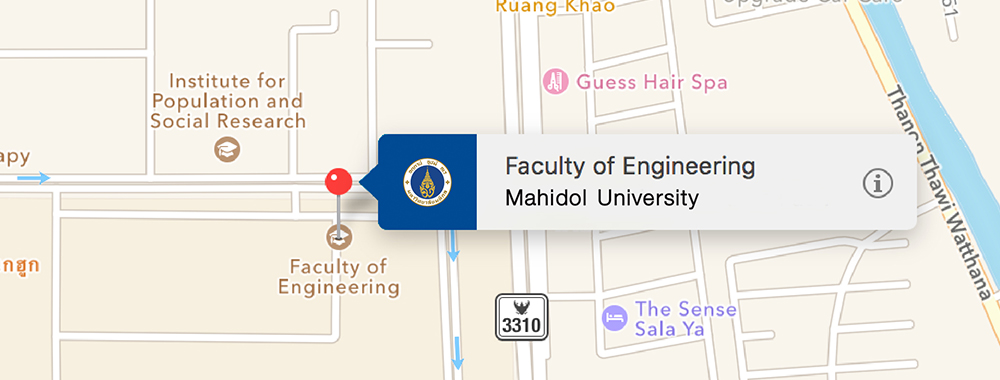5Organizations Cooperate to Create Thailand'sFirst Innovative System for Intelligent MedicalInformation and Full-service System (Thailand Health Data Space 5G)
With the world facing devastating infectious diseases, the international communities turned their focus now on the national health information system, which is a national security issue during normal times and the COVID-19 pandemic.
The Faculty of Engineering, Mahidol University cooperated with Information and Communication Technology Center, Permanent Secretary Office, Ministry of Public Health, Faculty of Engineering and the Faculty of Medicine, Naresuan University and Chanwanich Co., Ltd. to create an Intelligent Medical Information and Full-Service System.
This project has been promoted under the research and development program of the Office of National Broadcasting and Telecommunications Commission (NBTC). D-Day develops 5G innovative systems for intelligent medical information in Thailand (Thailand Health Data Space) in order to use technology and innovation to enhance the health system in all its dimensions, from transmitting information across the hospital, diagnosis, treatment, follow-up, rehabilitation, allowing doctors to treat emergencies, saving the patient's life in time, patients receiving good health services in all areas of the country, reducing the healthcare system congestion, to medical personnel being able to provide efficient services along with promoting and protecting the health of Thai people.
Assoc. Prof. Dr.Jackrit Suthakorn, Dean of the Faculty of Engineering, Mahidol University said that the research and development of Thailand’s Intelligent Medical Information System (Thailand Health Data Space 5G) is the first comprehensive development of the country's Big Data Health Information Platform. There are 3 components:
1. Big Data Infrastructure: The infrastructure platform and medical-health effective use of information, and how to connect the security and personal health information;
2. The Information System of Hospital Networks throughout the Country: Both within the hospitals and between hospitals and various health service units, doctors can have quick access to the health information of patients;
3. Applications: It includes a network of health service applications, various startup consulting centers, and telemedicine between the healthcare providers and the patient. This project received research and development funding in Phase 1 from the Office of the NBTC. The plan is divided into 3 phases:
• Phase 1 Development of Big Data Infrastructure, Medical Informatics, and the THDS Sandbox test sample in the target hospital;
• Phase 2 Development of a system to be able to link health information with the hospital network to cover the whole country;
• Phase 3: Linking health information to services and health tech partner organizations that allow patients access to their health information.
Dr.Keita Ono, Project Leader, recently organized a workshop to exchange information with physicians and healthcare professionals and to understand the process of medical work which is complex in terms of disease groups.
The objectives of this project truly meet the needs of data users at all levels. The Cooperation of all 5 organizations will create an impactful change in the health and medical care system by strengthening the sustainability of Thai public health. It will enhance the health-tech industry and help the country become a Medical Hub in response to the digital society and economy.
Dr.Anan Kanoksilp, Director of Information and Communication Technology Center, Permanent Secretary Office, Ministry of Public Health said that the project “Thailand Health Data Space 5G” will benefit Thai people and Thailand. We are going to transform Thailand into a sustainable society by connecting all sectors involved in the Thai health system to transfer information more efficiently. The use of technology and innovation will increase the efficiency of work and accuracy of information in healthcare system. The flow of information is beneficial to personnel and related medical departments. On the patient side, they benefit from the speed, quality, and safety of medical services during emergencies. The patient will be able to collect their medical history to guide and direct care for oneself and family members.
Adjunct Professor Dr.Kanchana Ngourungsi, President of Naresuan University said that it is a great pleasure for Naresuan University to be involved in driving this project. Associate Professor Dr.Suchart Yammen, Dean of the Faculty of Engineering and Professor Dr.Sirikasem Sirilak, Dean of the Faculty of Medicine played a role in the development of the third part of the project which is the application "Med Care". Med Care is a telemedicine service with a high-speed digital 5G network which will be accessible for all Thai people through mobile applications. Users can define which hospitals are allowed to submit their information into the system and can notify the cancellation of permission with this application. Med Care offers 4 services:
1. Specialist Doctors Application is a remote medical consultation system via smartphone helping doctors work faster with higher accuracy and reduced hospital congestion.
2. People Application has access to personal health information and medical resources.
3. Family Doctor Clinic Application is a memo for staff network in subdistrict health promoting hospitals and family doctor team. It increases efficiency in health promotion and disease prevention. It is used to contact patients more easily, to enter patient information into the system more accurately, and not to enter duplicate data.
4. Med Care application / Village Health Volunteer (VHV) is used for surveillance, prevention and disease control, health rehabilitation, and consumer protection monitoring.
Mr. Thanaphon Kongboonma, Chief Executive Officer of Chanwanich Co., Ltd., said that the key to improve the wellbeing of Thai people is for them to not get sick. Driving a public health system that provides access to health and medical services in an emergency will help to reduce the burden and cost of treatment. Upgrading Thailand's first innovative system for intelligent medical information (Thailand Health Data Space 5G) serves the same purpose. This time, it happens through a strong cooperation that will enable all sectors in the Thai health and public health systems to systematically analyze health information via connectivity. The exchange of information will occur on the same platform under world-class standards accepted by many countries such as the European Health Data Space standard, as well as the internationally accepted industry standard for data exchange in healthcare, Health Level Seven (HL7). As health data is sensitive, the THDS platform requires data security through secure and accurate access to information.
The development of intelligent medical information systems in Thailand requires linking “Technology” and “Social Services” that are in line with global trends through: 1. The importance of health information; 2. Utilization of information and applications through Artificial Intelligence (AI); 3. Cyber security; 4. Enhancing the quality of healthcare (Health Quality); 5. Social security; 6. Trusted provider; 7. Convenience in using the service (Comfortability); and 8. Transparency.













